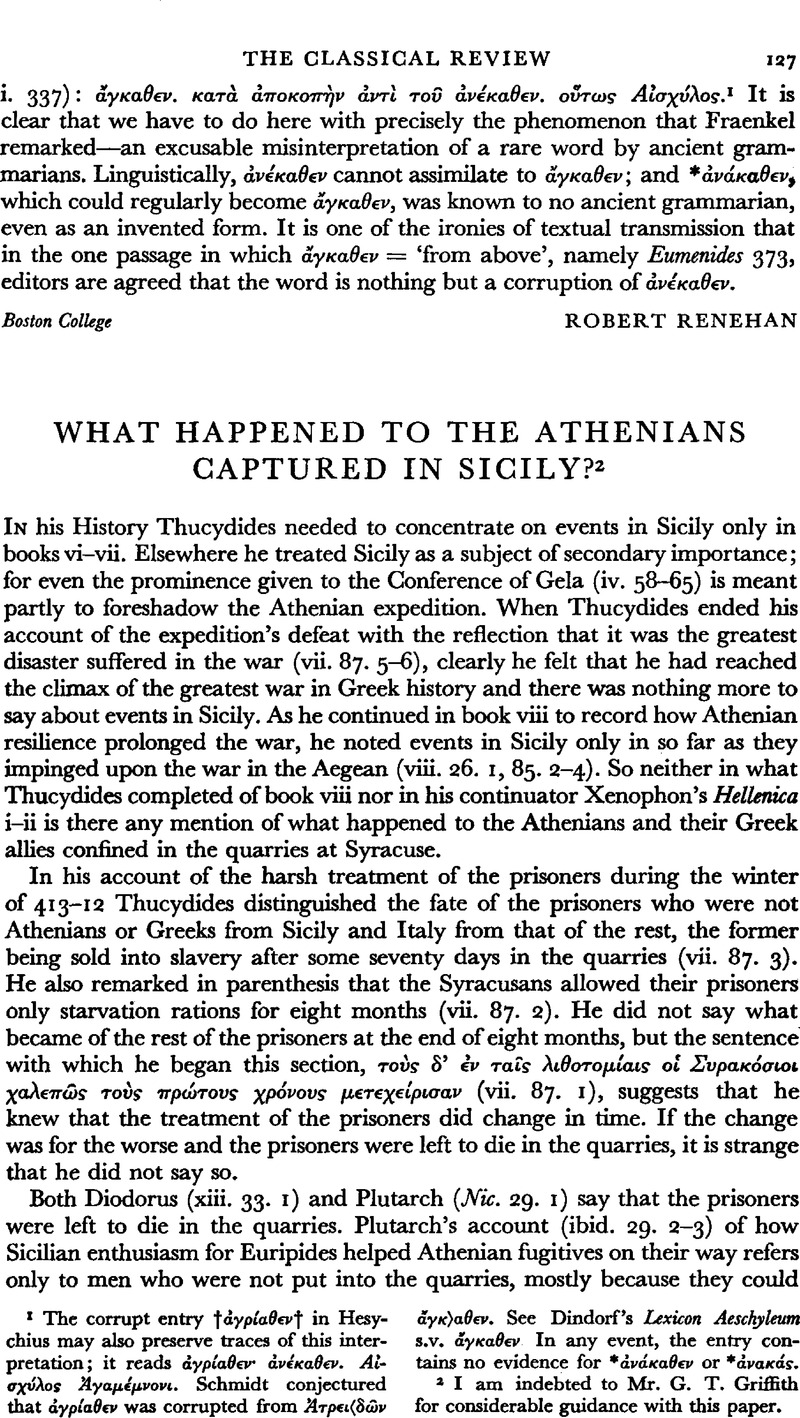No CrossRef data available.
Published online by Cambridge University Press: 27 February 2009

page 128 note 2 History of Sicily, iii. 407–10 and Appendix 24, 716–19.
page 128 note 3 Rostovtzeff, M., Social and Economic History of the Hellenistic World, i. 298, 382; ii. 1219.Google Scholar
page 128 note 4 Cf. Sen. Dial. 6. 17. 4: ‘videbis ubi Athenarum potentia fracta, ubi tot milia captivorum ille excisis in infinitam altitudinem saxis nativus career incluserat’.
page 128 note 5 On the practice of ransom see Phillipson, C., International Law and Custom of Ancient Greece and Rome, ii. 257–263Google Scholar; Lammert in R.-E. xiv. cob. 72–6, s.v. Lytra; Rostovtzeff, op. cit. iii. 1364f. n. 24.
page 128 note 6 The History of the Peloponnesian War by Thucydides, iii. 329, followed by Poppo and most recently by K. J. Dover on Thuc. vii. 87. 1. Similarly E. Meyer, Geschichte des Altertums, iv. 548.
page 128 note 7 History of Greece, v (1862), 303.
page 129 note 1 In refusing to give up the Syracusan admiral, Iphicrates may have intended to provide Athens with a victim in return for Demosthenes.
page 129 note 2 Thucydides' account of the capture of Nicias' and Demosthenes' divisions of the army respectively (vii. 81. 4–82. 3; 84–5) gives the impression, perhaps deliberately, that Nicias' men came off better in the end. For although Nicias did not negotiate a surrender, those of his men who survived the massacre had at least some chance of escaping, either at once in the confusion or afterwards, when most of those taken alive were secreted by their captors and kept as privately owned slaves. But after surrendering en masse Demosthenes' men were put into the quarries without any chance of escaping to Catana and Thucydides said nothing more about them. Was Thucydides letting certain selected facts speak in Nicias' favour, at a time when his country had damned his memory (Philistus, F. Gr. Hist. 556, F53; cf. the apologia in Lys. 18. 2–3).
page 129 note 3 Identified by Busolt, (op. cit. p. 128, n. 1), 1391, n. 1, with the Athenian Lycius, son of Polystratus in Xen. An. iii. 3. 20.
page 130 note 1 That is, at the standard rate of a mina a head (Arist. E.N. 1134 b 21–2). Higher rates are attested; see Herod, v. 77, vi. 79 and the works cited on p. 128,11.5.
page 131 note 1 Cf. F. Gr. Hist. 556, F51 (Theon's charge that Philistus plagiarized Thucy- respondides).
page 131 note 2 E. Schwartz, R.-E. v. col. 681, s.v. Diodorus no. 38.
page 131 note 3 F. Jacoby, F. Gr. Hist. 566, commentary on F97–102; Barber, G. L., The Historian Ephorus, 164–168.Google Scholar
page 131 note 4 Barber, op. cit., 80–1.
page 131 note 5 Barber's view that Ephorus was responsible for the higher stylistic level than usual in the speeches in Diodorus xiii. 20–32 entails the belief that in his speeches Ephorus rose above a style that in narrative is ‘equally as uninspiring’ as Diodorus'.